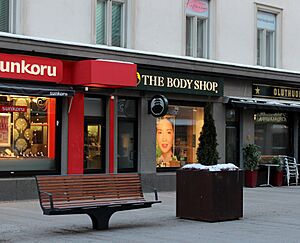The Body Shop facts for kids
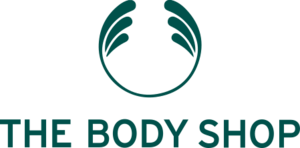 |
|
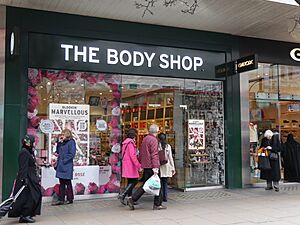
The Body Shop, Oxford Street
|
|
| Subsidiary | |
| Industry | Cosmetics |
| Fate | Administration |
| Founded | 27 March 1976 Brighton, England |
| Founder | Anita Roddick |
| Headquarters |
Brighton, England
|
| Products |
|
| Revenue | |
|
Number of employees
|
10,000 (2017) |
| Parent | L'Oréal (2006–2017) Natura & Co (2017–2023) Aurelius Group (2023–2024) Auréa Group (2024–present) |
The Body Shop International Limited, known as The Body Shop, is a British company that sells cosmetics, skin care products, and perfume. It was started in 1976 by Anita Roddick in Brighton, England. Today, the company's main offices are in London Bridge and Littlehampton, West Sussex. Auréa Group currently owns The Body Shop.
From 2006 to 2017, The Body Shop was part of the French cosmetics company L'Oréal. In September 2017, L'Oréal sold it to Brazil's Natura & Co for £880 million. Later, in November 2023, Natura sold the company to Aurelius.
In February 2024, Aurelius announced that The Body Shop's UK business was facing financial difficulties and needed special help called administration. This meant the company planned to close almost half of its 198 stores in the UK. They also reduced the number of staff at their main office by 40%. In March 2024, The Body Shop also closed its stores in the United States. It reorganized its business in Canada under special protection. Auréa Group bought The Body Shop in September 2024.
Contents
The Body Shop's Story
An earlier store called The Body Shop opened in California, USA, in 1970. It was not connected to Anita Roddick's company.
How The Body Shop Started
Anita Roddick opened her own health and beauty store, named The Body Shop, in her hometown of Brighton, UK, in 1976. She wanted to earn money for herself and her two daughters while her husband was away.
The company's main idea was to sell products made with natural ingredients. These ingredients were sourced in a fair way, and the products were not tested on animals.
The first store sold only 25 different products. Anita Roddick bought bottles that were once used for urine samples from a nearby hospital to sell her products. She did not have enough bottles, which led to the company's policy of refilling bottles. The labels were written by hand, and Roddick did not pay for big advertisements. Instead, she used local newspapers to spread the word.
Growing the Business
In the late 1970s, Anita's partner, Gordon, returned to Brighton. He suggested that the business should grow by allowing other people to open Body Shop stores, which is called franchising. By 1984, The Body Shop had 138 stores. Most of these, 87, were outside the UK. By 1994, almost 90% of the company's stores were franchises.
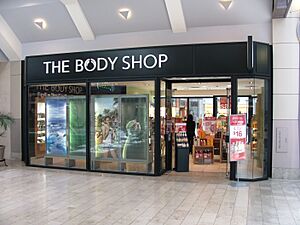
The company started selling shares to the public on the London stock market in April 1984. This meant people could buy a small part of the company. The shares started at 95 pence. The Roddicks kept 27.6% of the shares, and Anita stayed in charge to guide the company. After it was fully listed on the London Stock Exchange, the share prices grew a lot.
In 1987, Roddick paid the owners of the original US Body Shop, Peggy Short and Jane Saunders, $3.5 million. This gave her the only rights to use the brand name. The US company changed its name to Body Time in 1992 and closed in 2018.
In 1991, The Body Shop took Bath & Body Works to court. They said Bath & Body Works copied their marketing ideas. They settled the case outside of court.
Throughout the 1980s and 1990s, The Body Shop supported many campaigns about social and environmental issues. For example, in 1987, they started a "Trade Not Aid" campaign. This meant they bought some ingredients directly from the local communities where they came from. The company also worked with groups like Greenpeace and Amnesty International.
Changes in the 2000s and 2010s
In March 2006, The Body Shop agreed to be bought by L'Oréal for £652.3 million. The Roddicks earned £130 million from this sale.
Some people were concerned about this sale because L'Oréal had used animal testing in the past. Even though L'Oréal stopped animal testing in 1989, they sold products in China. In China, the law required cosmetics to be tested on animals before they could be sold. Anita Roddick said she hoped the sale would allow her to be like a "Trojan Horse" inside L'Oréal. She wanted to help improve their standards on animal testing and environmental issues.
In September 2007, Anita Roddick passed away.
In 2017, L'Oréal sold The Body Shop to the Brazilian cosmetics company Natura for £880 million. At that time, The Body Shop was one of the biggest cosmetics chains in the world. It had 3,200 stores and 17,000 employees in 66 countries.
The Body Shop received its B-Corp certification in 2019. This means it met high standards for social and environmental performance.
New Owners and Challenges
In November 2023, Natura sold The Body Shop to Aurelius, a German investment group, for £207 million. This sale was part of Natura's plan to become a smaller company.
At first, people thought Aurelius got a great deal. However, after the sale, Aurelius faced money problems with The Body Shop.
On September 7, 2024, Auréa Group bought The Body Shop. Mike Jatania became the new leader of the company.
Financial Difficulties and Closures
On February 15, 2024, Aurelius put The Body Shop's UK business into administration. This means the company needed help from experts to manage its money problems. The UK business owed over £276 million to others. After making changes, 82 UK stores closed, and 489 jobs were lost. Another 329 jobs were cut at the company's main office.
On May 17, 2024, it was announced that The Body Shop's UK business and its assets would be sold in an auction.
Closures in Europe
On February 16, 2024, The Body Shop Germany also went into administration. All 60 stores there were set to close. The Body Shop also hired help for its businesses in Belgium, Ireland, Austria, Luxembourg, and France. All of these were expected to go into administration soon after.
By the end of February 2024, all of The Body Shop's Irish stores had closed. In November 2024, The Body Shop Netherlands also faced bankruptcy.
Closures in North America
On March 1, 2024, The Body Shop Canada asked for protection from its creditors. It announced it would stop selling products online and close 33 of its 105 stores. On the same day, The Body Shop USA closed all its stores and stopped online sales. On March 10, The Body Shop USA filed for Chapter 7 bankruptcy to close down completely.
Closures in Oceania
On January 22, 2025, The Body Shop New Zealand also went into administration. While its 16 stores stayed open, they stopped accepting loyalty points and limited the use of gift cards.
Selling Products in Other Ways
Besides its stores, The Body Shop also sold products through a program called "Body Shop at Home." This program started in 1994. It allowed people to sell products from their homes, often by hosting parties. These sellers, called consultants, could also ask others to join and sell products.
The Body Shop at Home announced it would stop trading on February 23, 2024, in the UK and Australia.
Helping the World: Social Activism
The Body Shop has always aimed to be more than just a business. Anita Roddick believed in using her company to make positive changes in the world. She often spoke out against the cosmetics industry for not caring enough about the environment or for promoting unrealistic ideas of beauty.
In 1997, Roddick started a worldwide campaign to help women feel better about themselves. It spoke out against how the media often showed very thin models.
Community Trade Program
The Body Shop started its Community Trade program in 1987. This program was about buying natural ingredients or handmade items from communities that needed help. The company paid them a fair price. Examples of ingredients include Brazil nut oil, sesame seed oil, honey, and shea butter. The first product from this program was a wooden roller from a small community in southern India.
The Body Shop often invited its employees and others to visit these communities. This helped them see how the program made a positive difference.
No Animal Testing Policy
The Body Shop has worked to end animal testing for cosmetics since 1989. They have partnered with an animal welfare group called Cruelty Free International (CFI). The Body Shop's products are not tested on animals and have CFI's Leaping Bunny logo.
In June 2017, The Body Shop and CFI launched a big campaign called "Forever Against Animal Testing." Their goal was to ban animal testing for cosmetics everywhere and forever.
In October 2009, The Body Shop received an award from the RSPCA in Britain. This was for their strong policy that ensures their ingredients are not tested on animals by their suppliers.
In 2021, The Body Shop announced that all its products would be certified vegan by the Vegan Society by the end of 2023. This goal was achieved in January 2024.
The Body Shop Foundation
The Roddicks started The Body Shop Foundation in 1990. This foundation supports projects around the world that work on human rights, civil rights, and protecting the environment and animals. The foundation was created to bring together all the money the company gave to charity. So far, it has given over £24 million in grants.
In 2017, The Body Shop announced a new plan for its charity work called the World Bio-Bridges Mission. This mission aims to increase the variety of life (biodiversity) around the world. It also tries to create ways to get ingredients that help the environment.
Products You Can Find
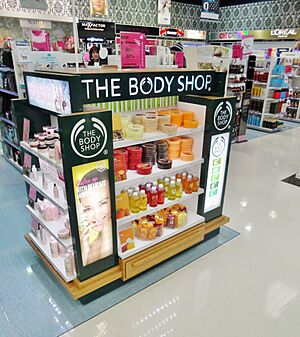
The Body Shop sells many different products for your body, face, hair, and home. The company says its products are "inspired by nature." They use ingredients like marula oil and sesame seed oil, which they get through their Community Trade program.
Some of their products include:
- Body butters (like Moringa, satsuma, strawberry, olive, shea, mango, and coconut)
- Body products such as body scrub and bath lilies
- Makeup (like mascara, lipstick, lip gloss, and eye shadow)
- Full skin care lines (with ingredients like tea tree, vitamin C, vitamin E, aloe vera, and seaweed)
- Men's skin care (including products with maca root and white musk)
- Hair care (like banana shampoo and conditioner)
- Fragrances (for women and men)
- Bath products (like shower gels and solid soaps)
- Face masks (including sheet masks)
 | Precious Adams |
 | Lauren Anderson |
 | Janet Collins |


